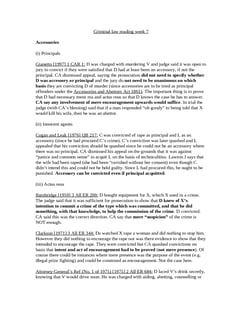Judgement for the case R v Caldwell
KEY POINTS
Arson involves intentionally setting fire to property (actus reus) with the required intent (mens rea), which can be either recklessness or intent to damage or destroy property. Arson endangering life includes a higher degree of intent, risking harm to human life.
The defense of drunkenness is rarely accepted in arson cases if the defendant still had the necessary intent (either recklessness or intent to damage or destroy property) even when intoxicated.
Arson is addressed under Section 1 of the Criminal Damage Act 1971 (c. 48), which prohibits damaging or destroying property with intent or recklessness. Relevant provisions cover various degrees of damage and endangering life.
FACTS
The defendant, motivated by a grudge against a residential hotel's proprietor where he had worked, intentionally set fire to the hotel while intoxicated. He admitted his inebriation had prevented him from considering the potential risk to people's lives in the hotel.
In legal proceedings, he pleaded guilty to one charge under section 1 (1) of the Act of 1971 but not guilty to another under section 1 (2), which related to his alleged intent to damage property and endanger lives or recklessness regarding such endangerment.
During the trial, the judge instructed the jury that self-induced drunkenness could not be a valid defense for the charge under subsection (2). Consequently, the defendant was convicted and received a three-year prison sentence.
The Court of Appeal (Criminal Division) later overturned the conviction but maintained the three-year sentence for the charge the defendant had pleaded guilty to.
The case underwent further appeal.
JUDGEMENT
The appeal was dismissed. In cases where a charge under section 1 (2) of the Act is formulated to solely allege the defendant's intent to endanger life, evidence of self-induced drunkenness may be considered a relevant defense. However, it is not admissible as a defense when the charge includes an element of recklessness regarding whether life would be endangered.
COMMENTARY
This case revolves around arson and its connection to the specific offense of arson endangering life. It also examines the applicability of the drunkenness defense in cases where arson occurs while the defendant is intoxicated.
The defendant intentionally set fire to a residential hotel due to personal grievances while under the influence of alcohol. He acknowledged that his drunken state prevented him from realizing the potential danger to people's lives in the hotel.
This case revolves around arson and its connection to the specific offense of arson endangering life. It also examines the applicability of the drunkenness defense in cases where arson occurs while the defendant is intoxicated.
The defendant intentionally set fire to a residential hotel due to personal grievances while under the influence of alcohol. He acknowledged that his drunken state prevented him from realizing the potential danger to people's lives in the hotel.
The judge instructed the jury that self-induced drunkenness could not be a valid defense for the charge under subsection (2). Consequently, the defendant was convicted and received a three-year prison sentence.
The Court of Appeal (Criminal Division) later overturned the conviction but maintained the three-year sentence for the charge to which the defendant had pleaded guilty.
ORIGINAL ANALYSIS
Caldwell (C) set fire to a hotel and was so drunk that he was unaware of the lives he endangered. He pleaded guilty to intending to damage property but not guilty to intending to endanger life.
The majority decision was that reckless is a common sense word and adding the labels of objective or subjective solve nothing.
What they ended up with though was an objective test whereby if a “reasonable man” could perceive danger then recklessness was held to exist. Being reckless was held to be a “sufficient alternative” to mens rea.
Lord Diplock
Says that the subjective test allows genuinely thoughtless people to escape punishment and that this is wrong.
RELATED CASES
For Further Study on R v Caldwell
Need instant answers? Our AI exam tutor is here to help.
Ask questions 🙋 Get answers 📔 It's simple 👁️👄👁️
Our AI is educated by the highest scoring students across all subjects and schools. Join hundreds of your peers today.
Get StartedRelated Product Samples
These product samples contain the same concepts we cover in this case.
| Criminal Law | Homicide Notes (20 pages) |
| Criminal Law | Mens Rea Short Notes (8 pages) |
| Criminal Law | Mens Rea — Intention Recklessness And Negligence Notes (24 pages) |

 Since 2010, Oxbridge Notes has been a trusted education marketplace, supplying high-quality materials from top achievers at universities like Oxford, Cambridge, LSE, Harvard, and Yale.
Since 2010, Oxbridge Notes has been a trusted education marketplace, supplying high-quality materials from top achievers at universities like Oxford, Cambridge, LSE, Harvard, and Yale.